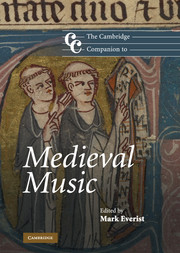Introduction
Published online by Cambridge University Press: 28 September 2011
Summary
‘O sing unto the Lord a new song’ is the text introduced by the initial on the cover of The Cambridge Companion to Medieval Music. But our two Austin canons pictured in the initial stand with their mouths resolutely closed. Furthermore, it is difficult to square the elaborate ligatures on the roll before which the two Augustinians stand with any sort of psalmody; at the very least the music looks more like a melisma from a gradual, alleluia or responsory; the more optimistic modern gaze might even see the tenor of a polyphonic work there. And while the cleric on the right is pointing to the notation on the roll, there is very little doubt that the one on the left is indicating solmization syllables on his hand (although never described by Guido d'Arezzo, this practice was known throughout the Middle Ages as the Guidonian Hand). In many ways, then, the initial that adorns this book addresses issues raised by its contents: monophony and polyphony, psalmody and composed chant, written and unwritten, codex and rotulus, musical literacy, cheironomy, silence and sound.
The component parts of our ‘Cantate’ initial are very much the concerns of the contributors to The Cambridge Companion to Medieval Music. We are interested, of course, in following the path of music history from the middle of the first millennium to around 1400, but we are also interested in the ways in which plainsong and polyphony interact: there is always the risk in any book of this sort of treating monophony – liturgical, sacred and vernacular – as something that stopped as soon as someone sang a fifth above a fundamental, and our accounts, for example, of the role of plainsong in trecento Italy or in Parisian organum of the twelfth century, or the weight given to Machaut’s monophonic songs will make clear our reluctance to fall prey to this sort of reasoning.
- Type
- Chapter
- Information
- The Cambridge Companion to Medieval Music , pp. 1 - 6Publisher: Cambridge University PressPrint publication year: 2011



